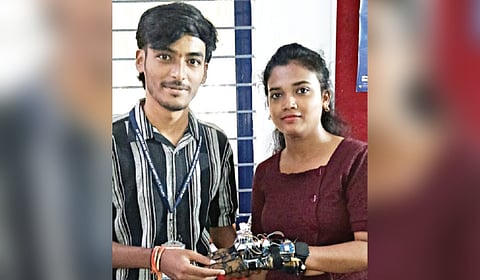

MYSURU: Keeping women’s safety in public spaces in mind, a 21-year-old final-year student from the Electronics and Communication Engineering Department at Sri Jayachamarajendra College of Engineering (SJCE) in Mysuru has developed an innovative Intelligent Geofence-enabled Wearable System (IGWS) that can relay alerts to the user’s emergency contacts in case of deviation, along with her location, in real-time.
Geofencing allows creating a virtual geographic boundary around an area using global positioning system (GPS) or radio-frequency identification (RFID) – a technology using radio waves to automatically identify and track items or people – and enables the software to trigger responses when the device carrying that software enters or leaves the area.
The youth, Karan D, told The New Sunday Express at the Open Day 2025 at the SJCE campus on Saturday where he showcased his smart wearable device, that the device enhances safety by allowing users to define “safe zones” (geofences) and enabling pre-designated emergency contacts to receive alerts when user enters or leaves these areas.
“One of the key features is a geofence-based stranger-following detector,” said Karan.
“If a woman is being followed by someone for more than three minutes, the device detects the persisting presence of the same mobile phone (of the suspected stalker) or Bluetooth MAC address (also known as a Bluetooth Device Address, a unique identifier assigned to each Bluetooth device, which can help identify and locate devices during communication).
Device includes a geofence-based safety timer
“For instance, if a woman is walking home from college and the same Bluetooth signal follows her across multiple geofenced points, IGWS’ ESP32 chip (a low-cost, low-power System-on-a-Chip (SoC) microcontroller with integrated Wi-Fi and Bluetooth capabilities) sends a vibration alert to the user and transmits her live location along with the stalker’s MAC address to her emergency contacts,” Karan said.
The device also includes a geofence-based safety timer. This allows users to set a time-bound goal for reaching a destination. “If a woman says she’s going shopping and plans to return home in 30 minutes, the system monitors her geolocation.
If she hasn’t returned her home geofence within the set time, the ESP32 automatically sends her current location to her emergency contacts,” he said, adding that the device also includes a ‘return home safety reminder’, which sends alerts if the user is out late and still outside her designated home geofence.
Another safety feature is the danger-zone entry notifier, which uses a preloaded list of high-risk GPS locations. If the user enters one of these zones, the wearable triggers a buzzer and notifies her emergency contacts. A timer starts upon entry, and if the woman remains in the area beyond the pre-set time, repeated alerts are sent to her contacts.
Karan has developed the system using wearable gloves, but admitted to its inconvenience for everyday use. “Gloves can be uncomfortable for regular wear, especially when going out. This system can be easily adapted to a smart watch, which is far more practical… I can develop this technology further for wristwatch integration,” he added.
His guides Prof Madusudan MP and Prof Yashwanth SD, from SJCE’s Electronics & Communication Engineering Department, who helped him develop the device, will help him reach out to companies to demonstrate the IGWS’s features.